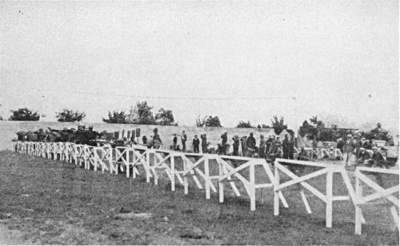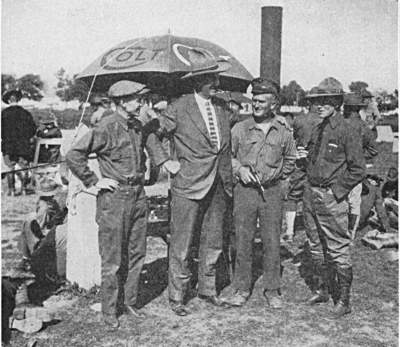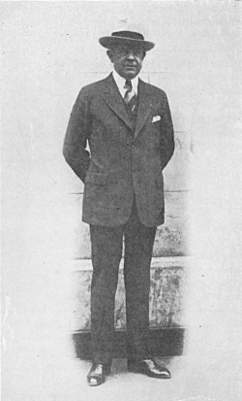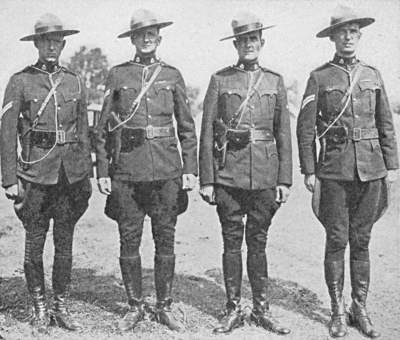The following information on handgun match shooting comes from Section 8 of Shooting by J. Henry FitzGerald. Shooting is also available to purchase in print.
Match shooting does not materially differ from other sports. If running one hundred yards practice for one hundred yards, if running one mile practice for one mile, if shooting fifty shots in one hour at fifty yards practice fifty shots in one hour at fifty yards.
If practicing for a match that calls for slow fire ten shots in ten minutes, ten shots each five in twenty seconds, and ten shots each five in ten seconds. One should shoot ten shots slow fire to accustom himself to light condition, appearance of sights, steady holding, etc. Then one string of ten shots each five in twenty seconds to gradually increase the speed, and twenty seconds to the experienced rapid fire shot is practically slow fire and should be within two points of the slow fire score. Then eight strings of ten shots each five in ten seconds. One hundred shots is enough for one day’s practice and all such matches are won by the ten second score. The expert ten second man may be several points behind on slow fire and twenty seconds and still win on his ten second score.

The idea that he wants to know at all times how the match is progressing is strong in all target shooters, and this is one place where every man should tend strictly to his own business and let the team captain worry about little details, such as the scores being made by other members of the team or club. When doing team shooting try to outshoot the member of the opposing team that is on the line at the same time that you are and let your comrades do the same. Never go into a match with the fear that a poor score will be the result. All any contestant can hope for is to shoot his average score and remember if the first shot should be a six that several ninety-three and ninety-four scores have been made with this start.
Mark well what Sergeant Young tells you about harmony in a shooting team. The team cannot succeed without it. One grouch will spoil the prospects of the entire team as will some one who will not do exactly as he is told. The individual may profit by the mistakes of others. Worry has lost many a match; just make the best possible score and be happy. Shooting is a pastime or recreation and a wild shot is not a matter of life and death. If this should happen in one match try to avoid it in the next one.

Why do contestants who are making excellent scores on the home range take the trip to Perry and upon appearing on the firing line immediately get the idea of changing sight, trigger pulls, etc. They have made excellent scores at home and the sights that are right in Oklahoma are not far wrong at Perry, and the same thing goes for the trigger pull. A big shoot is no place to sight in a pet target arm if it can possibly be done at home. If an arm which has been doing dependable work for many months on one range is taken to another range and should shoot either right or left, look for light conditions; the trouble is seldom with the revolver. The shooter can check the time for changes in the arm by his score; if he is averaging over the ninety mark think over very carefully the matter of changing sights or pull. If not over eighty per cent is the average, then change everything if it will better the score.
The greatest handicap for contestants at Camp Perry is the fact that ammunition is furnished and many contestants feel that the more they shoot the better their chances are of winning the big matches. This is not true. The contestant who will content himself with his normal amount of practice will, when the day of the match arrives, make better scores then he who feels it is his duty to burn up all the ammunition in sight. The man who goes to Camp Perry or any other big shoot with the idea of winning matches should do all his serious practice work on his home range, and only shoot enough to keep in top form after arriving at the place where the shoot is to be held. Every contestant is either coming up or going back on the day of the shoot. We never stand still and on the day of the shoot we should be, by carefully timing our practice work, coming up; in shooting terms the man who is going stale is not in condition to win a match. Re-entry matches has been the downfall of many possible winners,—too much practice.

I believe I am well qualified to speak on this subject of too much practice. While a man may accustom himself by constant practice to shooting many hundred shots each day, my experience in the testing range has taught me that there is a limit to human endurance. Constant shooting day after day will eventually burn out or overtrain even a man with iron nerves. If a man, who has acquired, through years of practice, the ability to shoot with a degree of accuracy eight hundred to one thousand shots each day, cannot do his best work after such practice, how can a man who normally shoots fifty or seventy-five shots in practice each day or twice each week appear at the big shoot and fire four or five hundred shots without becoming overtrained.
One very serious handicap is the fact that many of the men who condition themselves on the home range must do so by shooting alone or with one or two club members. Added noise, change in conditions, and one hundred and one different things will tend to disturb him and consequently his scores will be several points lower at the range where the match is being held. But remember all the other competitors have the same conditions to overcome and their scores will not be what they were at home.

A good telescope in the hands of a team member or coach will eliminate the bother of spotting every shot fired and will allow more time for study of conditions and corrections. It also lessens the eye strain and distortion of sight which comes from continued use of the telescope when spotting bullet holes in the target.
The world of sports loves a good loser. The man who can lose a match and shake hands with the winner and mean it is the man who is getting real pleasure out of his shooting hours. And there is always a next time to win. There is always a real thrill in coming back and beating the man who caused you to finish in second place the last meeting.
